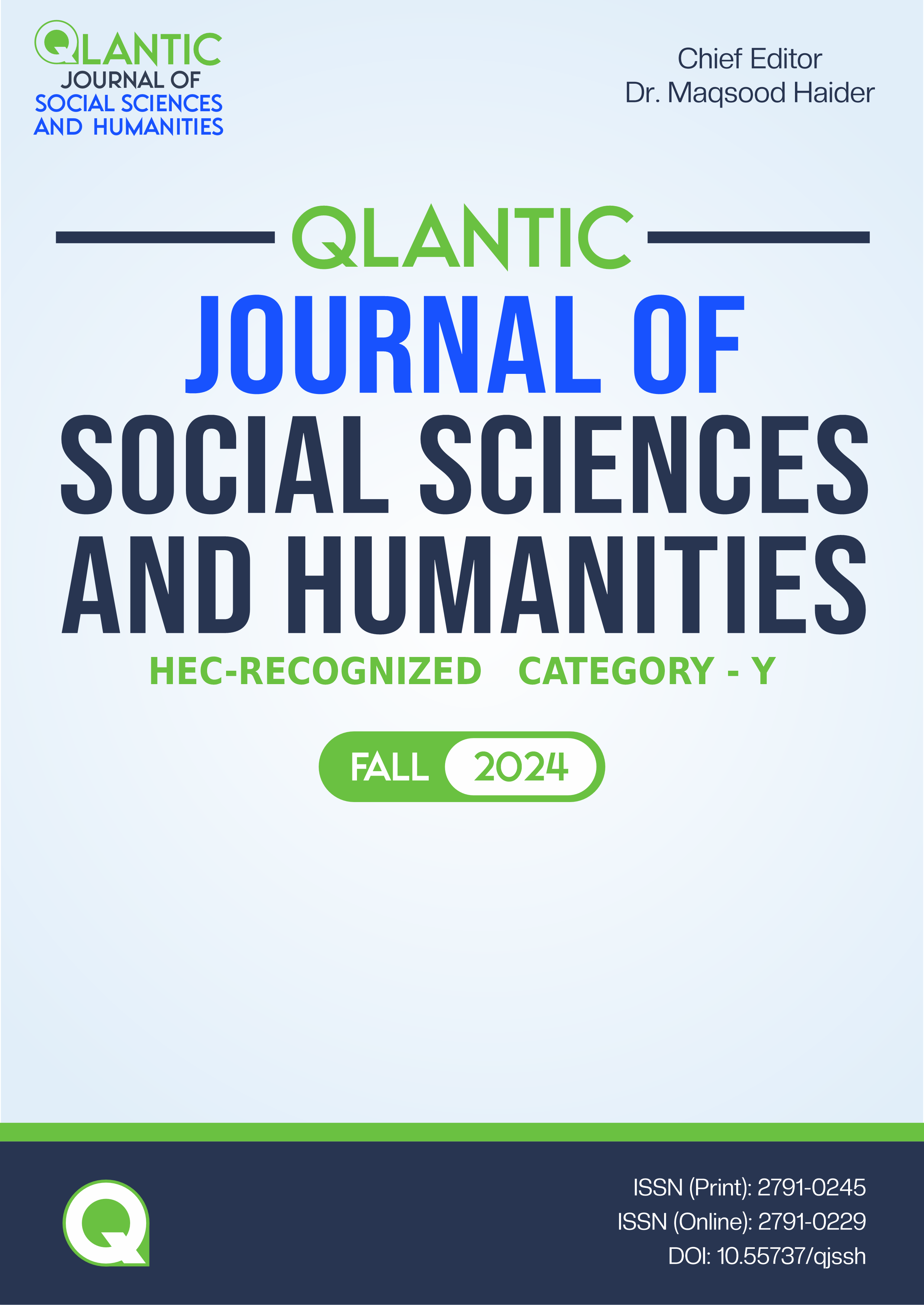Ecological Resilience in Elise Paschen's Poems “The Tree Agreement”, “Aerial, The Wild Pine” and “ Moss in April”
DOI:
https://doi.org/10.55737/qjssh.93691570Keywords:
Anthropogenic Activities, Adaptation, Ecological Resilience, Disturbance, High StabilityAbstract
This research study aimed to examine the ecological resilience against the disruption in ecological networks in Elise Paschen's eco-poetry. The objective of this research delineated the investigation of the adaptive cycle. This adaptive cycle is responsible for ecological resilience and stability. The theoretical framework engaged in this qualitative research was Lance H. Gunderson's "Ecological Resilience—In Theory and Application" and C.S. Holling's "Resilience and Stability of Ecological Systems". The result proclaimed that anthropogenic activities and disturbing agents like harsh weather conditions create environmental changes. This environmental turbulence in the ecosystem generates ecological resilience that leads to adaptability, high stability, flexibility, and growth to recover and maintain the ecological balance after absorbing certain disturbances. The ecosystem goes through four phases to complete the adaptive cycle: exploitative, conservation, disturbance, and reorganization. In conclusion, the highly resilient ecosystem absorbs the accelerating exploitative ecological crisis through adaptation and reorganization.
References
Baldi, P., Pedron, L., Hietala, A. M., & La Porta, N. (2011). Cold tolerance in cypress (Cupressus sempervirens L.): a physiological and molecular study. Tree genetics & genomes, 7, 79-90. https://doi.org/10.1007/s11295-010-0316-8
Gunderson, L. H. (2000). Ecological Resilience—In Theory and Application. Annual Review of Ecology and Systematics, 31(1), 425–439. https://doi.org/10.1146/annurev.ecolsys.31.1.425
Hajer, K. J., Hamoodi, M. N., & Al-Hameedawi, A. N. (2023). Urban heat islands: a review of contributing factors, effects and data. IOP Conference Series, 1129(1), 012038–012038. https://doi.org/10.1088/1755-1315/1129/1/012038
Holling, C. S. (1973). Resilience and Stability of Ecological Systems. Annual Review of Ecology and Systematics, 4(1), 1–23. http://dx.doi.org/10.1146/annurev.es.04.110173.000245
Lambert, C. (2011). “Elise Paschen’s Career in Poetry. | Harvard Magazine.” Harvard Magazine, www.harvardmagazine.com/2011/04/poeti
Paschen, E. (2020). “The Tree Agreement.” Poetry Magazine. https://www.poetryfoundation.org/poetrymagazine/poems/58635/the-tree-agreement
Paschen, E. (2024). “Aerial, Wild Pine.” https://www.poets.org/poem/aerial-wild-pine
Paschen, E. (2024). “Moss in April.” Rewilding.
Roy, M. (2022). Developing a Sustainability Mindset Through Nature Poetry. 10, 10(8), 2320–2882. https://ijcrt.org/papers/IJCRT2208202.pdf
Ruken Yaşlı, Cengiz Yücedağ, Ayan, S., & Bojan SIMOVSKI. (2023). The Role of Urban Trees in Reducing Land Surface Temperature. SilvaWorld, 2(1), 36–49. https://doi.org/10.29329/silva.2023.518.05
Weston, P. (2022, November 25). Humans vs. nature: Our Long and Destructive Journey to the Age of Extinction. The Guardian. https://www.theguardian.com/environment/2022/nov/25/cop15-humans-v-nature-our-long-and-destructive-journey-to-the-age-of-extinction-aoe
Zhang, Y. (2013). “Capitalism and Ecological Crisis.” Journal of Sustainable Society, 2(3), 69–73, https://doi.org/10.11634/216825851302440
Downloads
Published
Issue
Section
License
Copyright (c) -1 Javeria Kiran, Farieha Saeed

This work is licensed under a Creative Commons Attribution-NonCommercial 4.0 International License.





